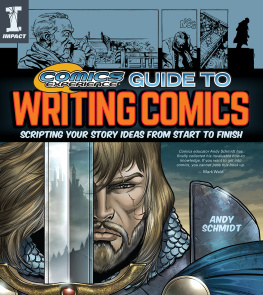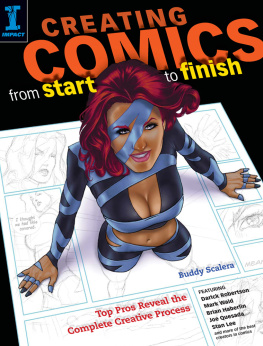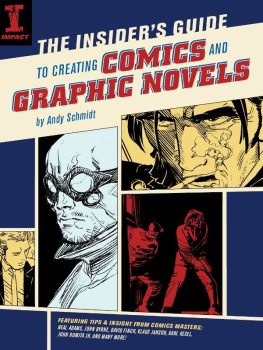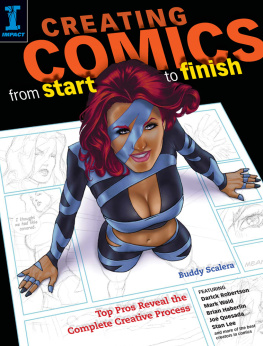Contents
Guide
COMICS EXPERIENCE GUIDE TO
WRITING COMICS
SCRIPTING YOUR STORY IDEAS FROM START TO FINISH
ANDY SCHMIDT

CINCINNATI, OHIO
IMPACTUniverse.com
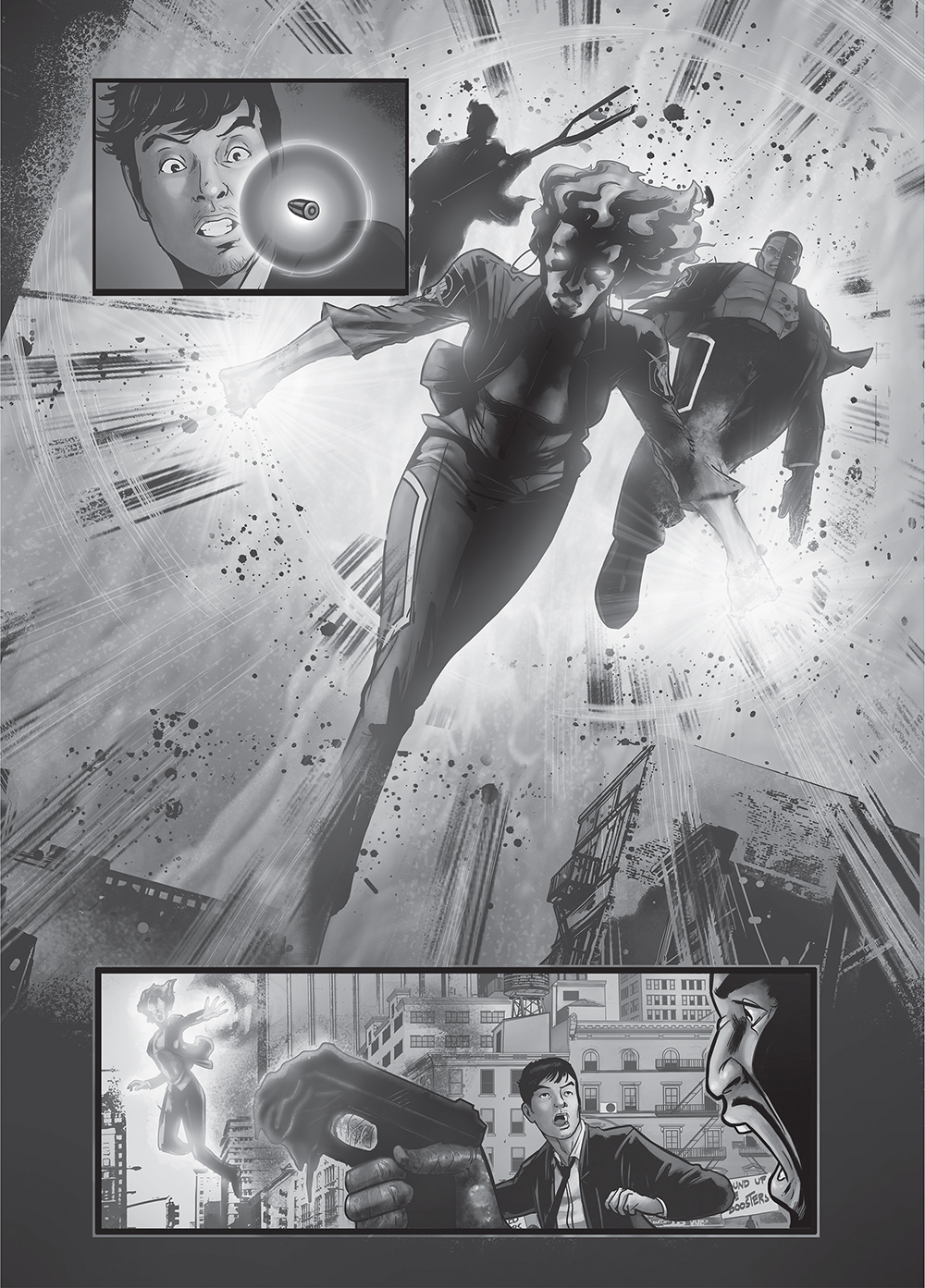
Achilles Inc. no. 1, interior. Interior art by Daniel Maine and Francesca Zambon. Copyright Andy Schmidt, 2017.
DEDICATION
This book is dedicated to my students at Comics Experience and the members of our Creators Workshop. As much as I have to offer you, Im certain that I receive twice as much back in the myriad of ways that you all inspire me, motivate me and teach me new things about comics and myself.
I am a better person for having known you all.
CONTENTS
Get started with a vocabulary lesson on all the important terminology used by writers and artists in the comics industry, then learn how to develop your initial concept an basic story structure.
Your characters are the most important aspect of your story, not to mention how your readers will connect with it as a whole. Learn to build compelling characters from scratch that will drive the action of your narrative and keep your readers coming back for more.
Learn to compose a story sentence, which is the seed from which your story will grow. Your story sentence is made up of four essential elements that make up the foundation of your story: character, goal, action and conclusion.
Delve into some of the more advanced topics of storytelling, such as theme, symbolism, pacing and genre, to expand your skill set as you grow as a professional storyteller.
The scalable process learned in this chapter can be just as successfully applied to a five-page short story or twelve-issue graphic novel. Learn to break down your story synopsis into progressively detailed layers such as chapters and scenes, plus acquire great tips and tricks for adding in exposition.
Expand on the layering process of Chapter 5 by creating a detailed outline of your story. By breaking down your story scene by scene and then page by page, not only will your comic book take on its full shape, but you will gain the confidence you need to formulate your first story pitch.
From the anatomy of a comic page to script formatting, this chapter teaches you how to write effective panel descriptions so that your artist can interpret your vision to the reader.
This chapter covers the unique aspects of writing for the visual medium of comics. Learn how to create the ultimate comics reading experience by maximizing key tools such as the page turn and splash page and get the most out of the relationship between your text and the art.
Theres no sugarcoating it: Writing natural and believable dialogue is tough work. Here we break down the basics of comic-book dialogue from script formatting to balloon placement to the power of subtext so you can connect your story and art in the best way possible.
This chapter presents a recap of everything weve covered up to this point through a real-life comic script example about four astronauts and their quest to save the Earth.
Unless you plan to design, ink, pencil, publish and market your comic-book script all by yourself, you will need skilled artists and collaborators to help bring your comic to life. Master the art of networking at comic conventions and on social media to meet the folks who can help you do just that.
The comics industry is constantly evolving, and focusing on your growth as a storyteller and building your personal network are the two best ways to stay ahead. This chapter discusses some of the nuances of the business and some of the ways you can break in.
INTRODUCTION
Im assuming youre going to write. There are many books on the subject of writing that take us from why we write to story structures and dos and donts. Thats not this book. This book is nuts-and-bolts fiction writingbut not just fictionfiction for comics.
As such, the book is broken into three sections:
- Breaking Story. Most of this section applies to story in any medium.
- Writing for Comics. This is how we break story for comics, where what you write stops being a story and becomes a comic-book script.
- Navigating the Comics Industry. This part isnt as fun for many people, but theres no getting around the importance of knowing the industry and getting to know people in it. This section will help you do just that.
In the cases of Parts 1 and 2, Ill outline and drill down on proven ways to break story. This isnt paint by numbersthat doesnt do any of us any good and leads to more mediocre and bad fiction. These are ways to help you get your story out, to help you become the writer inside of yourselfnot a clone of me.
As we move into the comics-script-writing side, theres one issue I have with most comics-script-writing books: They tell you the truth. Wait, is that a complaint? Not really. I dont fault any of those books for telling the truth, but not everyone needs to hear the truth. The truth is that there is no set way to write a comic-book script. There is no set format, no industry standard. Ultimately, what works, works. And that, dear readers, is absolutely true.
Unfortunately, its not terribly helpful to those of us trying to figure out how to write excellent comic-book scripts (like I was in St. Louis, Missouri, circa 1998). When I was reading books on comics writing, I was getting theory, but what I needed was the how-to knowledge of what makes a good script. How do I write compelling panel descriptions for my artist? How much dialogue works on a page? How much story can I cram into each panel? That book didnt exist then, and it doesnt exist now (at the time of this writing).
What Ive learned through years of teaching, both as a comics editor (on staff at Marvel Comics and IDW Publishing) and through my Introduction to Writing Comics class at Comics Experience, is another simple truth: While it is true that there are no industry standards, it is equally true that someone learning to write comicslearning to do anything for the first time, reallyneeds structure.
They need guidance, and when they look at a blank computer screen and start pounding away on a keyboard to create a script that an artist will draft from or that a letterer will letter from, that blank screen is too open. You can do anything on that screen. While freedom is an awesome and powerful thing, it can also be scary.
You have a story to tell. Its your story. But in order to tell it in comics, you have to be extremely good at all the obvious things that go with telling stories: character development, crafting character arcs, setting up conflict, plotting and creating highs and lows for your characters. Of course you have to do all that. And thats hard. In comics, you also have to be a co-creator, a collaborator and a partner, you have to be an art director, a problem solver and a project manager; you have to have an ear for dialogue, you must know pacing (visual as well as verbal), you have to inspire your artist, and you must compel your reader to push on from one page to the next. All this stuff is even harder!
Who of us is born with all of those skills, fully formed, inside of us? Ill tell you whonone of us. Dont believe me? Read the introductory chapters of

